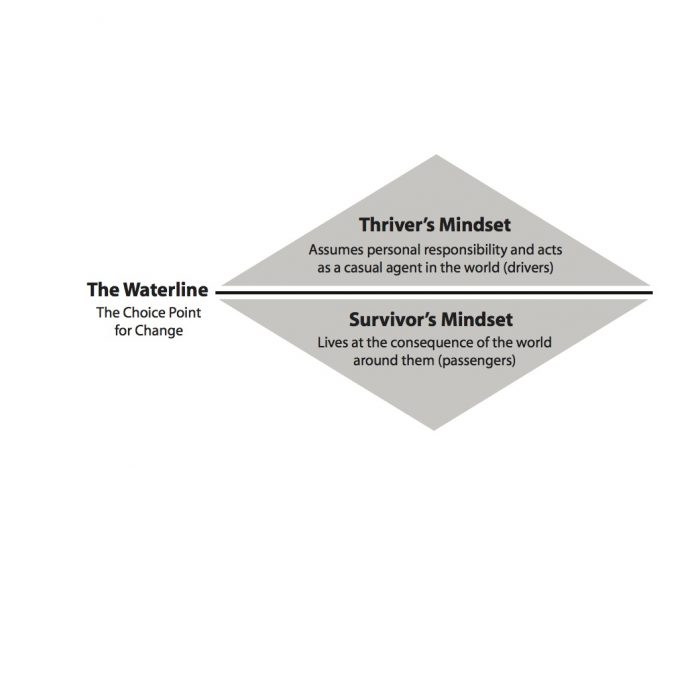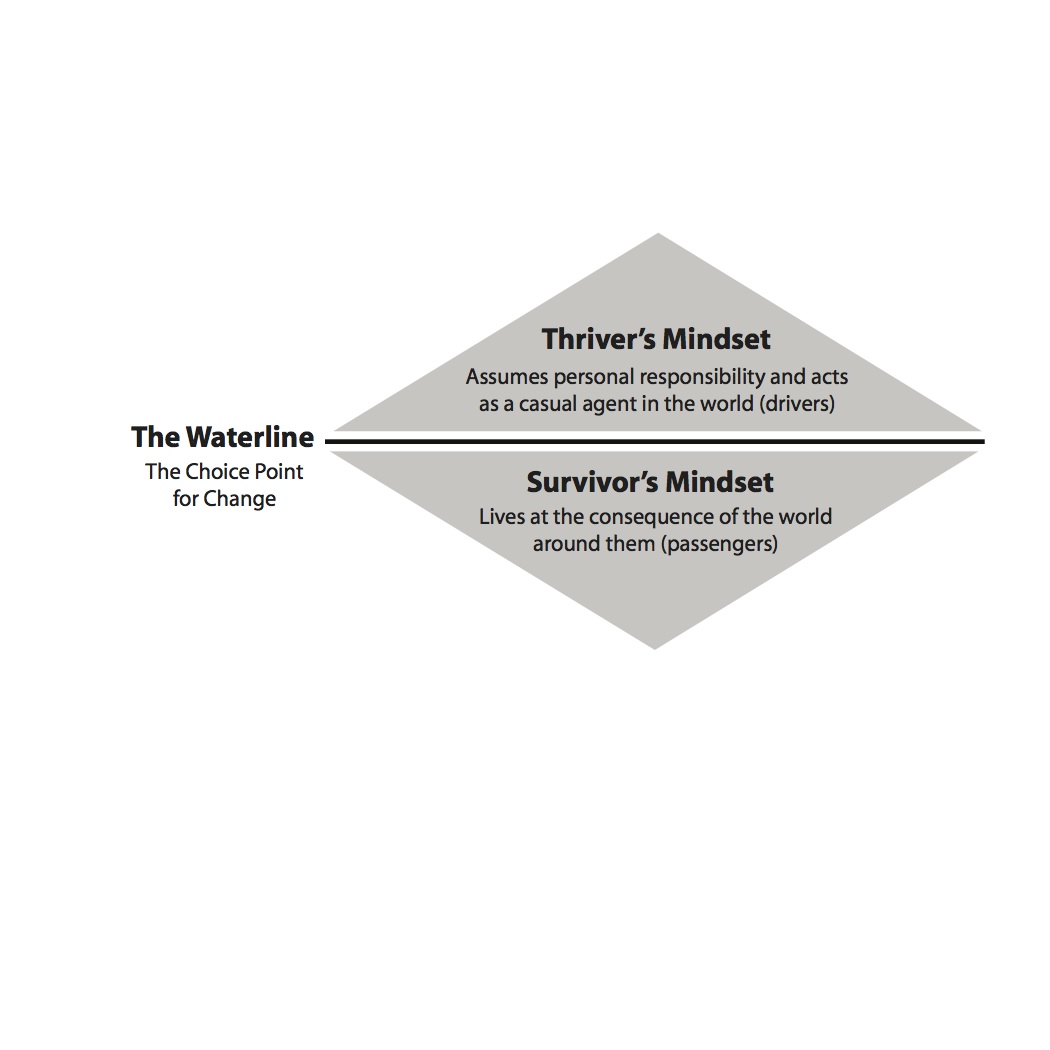
We are living in challenging times. In our work training, coaching, and developing people, it’s more critical than ever that we use models to help those we serve manage their mindset so they can deal effectively with the complexities and challenges of our times, regardless of whether they are leaders or individual contributors. In my work with several thousand Fortune 500 leaders, teams and executives as an executive coach and transformational leadership consultant over the years, one of the models I’ve used to help people become more accountable for their contributions is what I call “Operating Above the Waterline.” Here is an excerpt from my recent book, “The Thriver’s Edge: Seven Keys to Transform the Way You Live, Love and Lead” in which I outline what that entails.
Living Life Above the Waterline
Whether or not we’re aware of it, we constantly make choices about how we perceive ourselves and the world around us. Our choices determine our actions. And our actions and responses are driven by whether we feel victimized, are focused on survival, or are actively taking the steps to thrive. Our perception of our place on this continuum can vary from day to day, depending on our mood, our capacity for resilience, the state of our physical health, or the external challenges we’re facing. Learning how to manage our self-perceptions effectively versus allowing them to manage us is critical to self-mastery. Developing self-insight and the capacity to manage our state of mind enables us to choose healthy responses to the challenges we face.
To illustrate the power of how our perceptions inform our responses, imagine two triangles joined together in the shape of a diamond. The top half of the diamond includes the emotions, feelings, and qualities people experience when they are thriving. When we engage with life from this perspective, we feel empowered, engaged, confident, positive, creative, excited, and inspired. We perceive ourselves as causal agents in the world: drivers, rather than passengers. We focus proactively on the situations in our lives where we trust we can have an impact, instead of on all the reasons we can’t influence change. We take action, rather than waiting passively for things to happen. We become agents of change in our world.
Now imagine drawing a line through the diamond that disconnects the bottom half from the top. Think of this as the neutral zone that separates those who thrive from those who live in a state of survival. The neutral zone is also a decision point, the waterline, the place where we make the choice to drift, sink, or swim.

If we live our lives below the waterline, eventually we start to take on water. We don’t feel empowered to change things, and instead find ourselves reacting to whatever comes our way. We lack a sense of personal power. We may feel lethargic or held captive by inertia. Although we may do what it takes to get by every day, we know in our hearts that something’s missing. When we’re stuck in this place, we may try to convince ourselves that what’s familiar is better than the unknown, so we remain in our comfort zone until it becomes so constrictive, it feels intolerable; until it feels like there’s a larger force at play that’s compelling us to grow.
Jenny, one of my coaching clients who was grappling with this issue, said, “I’m bored with my life and my job. I want to make a bigger impact, but I’m scared to make a change. I’m afraid if I move to a different job or company, I’ll find out it’s not as good as the one I have now.” When contemplating a big change in our lives, many of us have experienced similar fears because resistance to change is a part of the human condition. But if we resist change for long enough, ultimately we become stagnant. So once our basic needs are met, it’s important to remember that we each have the power to make different choices.
The further below the waterline we drift in the bottom half of the diamond, the more we find ourselves living at the consequence of others’ ideas and decisions. This generates feelings of hopelessness, defeat, anger, pessimism, disconnection, and exhaustion. At the very bottom of this
half of the diamond is the terrain of powerlessness and victimization, where we deny all sense of personal responsibility and blame others for our failures and disappointments.
Because we’re human beings, we experience situations and sometimes deeply distressing events every day that are outside of our control. It’s true there are times when we can’t change what happens to us, but we can control how we choose to respond to those challenges. When life throws us a one-two punch, we always have two choices. Will we give up and drift to the bottom of the diamond, or do our best to swim past rough waters and stay above the waterline?
When we become more mindful of the ways we give away our power, we have the power to take the actions necessary to move to the top of the diamond and change our attitude, our behaviors, and our sense of personal agency. In a recent coaching session, a leader responsible for a multi-billion-dollar budget said, “Being exposed to this new way of thinking has literally changed everything, not just at work, but at home. Now I notice when I’m starting to sink and I self-correct. I no longer feel like a victim and I feel much more in charge of what’s happening in my world.”
Excerpt from “The Thriver’s Edge: Seven Keys to Transform the Way You Live, Love, and Lead” by Donna Stoneham, Ph.D. (She Writes Press, 2015, pp. 131-134).
Donna Stoneham, Ph.D., is a master executive coach, transformational leadership expert, author, activist, and speaker. For 25, she’s guided several thousand Fortune 1000 leaders, teams, and organizations unleash their power to thrive™ in work and life (www.positiveimpactllc.com). Her award-winning book, “The Thriver’s Edge: Seven Keys to Transform the Way You Live, Love, and Lead,” was named by BuzzFeed as “Nine Awesome Books for Your Kick-Ass Career.” She is also a contributor in two books, “The Coaching Code: Practical Tips for Cracking the Code and Building a Successful Coaching Business” and “Ask Coach” (October, 2016). (www.donnastoneham.com). Stoneham will be featured in the full-length documentary, Leap! The Coaching Movie (www.coachingmovie.com) (2017). Take Stoneham’s thriver quiz: http://donnastoneham.com/thrivers-quiz/ or follow her on Facebook: https://www.facebook.com/DonnaStonehamPhD/ or Twitter @DonnaStoneham.




